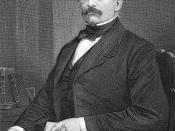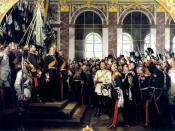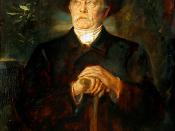Bismarck's Germany
Every country has its creators. In Germany, Otto Von Bismarck is
one of them. After being a major a player in German unification, Bismarck
eagerly joined into Germany's politics becoming chancellor. The setting up
of the German government, suppression of the Catholic Church's influence
on Germany, and the denouncing of socialism, are events that Bismarck was
heavily involved in during his time as being chancellor. Bismarck helped
shape the role of the new Germany for the end of the 19th century.
After the formation of the new Unified Germany, Bismarck took
immediate control of the country's government. Allowing Prussia to keep a
huge amount of influence on Germany's foreign affairs, Bismarck set up a
democracy. A federation of monarchies still remained though that would
reign over the German states. Two houses of delegates were created. One
called the Reichstag which was elected by universal suffrage, and an upper
house consisting of delegates representing the German princes.
Bismarck
as chancellor usually tried to have the Reichstag on his side, but he was
not scared to go against them. The lower house had many legislation
restrictions on it, and so was used to help keep the relations between the
government and the people good. Bismarck gave the upper house priority
in national affairs. By doing this, Otto Von Bismarck kept with the doctrine
signed at the begging of the new empire.
The Catholic Church was a pain in Bismarck's side from the start of
him being chancellor of Germany. After Bismarck took control of the
country, the Church condemned all attempts by the government to
intervene in education and church related events. This created a split in
the country between the fateful German liberals and the fateful Catholics.
The result was that a political party was formed called the...


